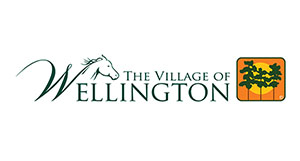On Thursday, Aug. 29, the Village of Wellington invited livestock waste haulers to a meeting designed to discuss horse manure and how it can be handled this upcoming season and into the future.
The meeting was organized and led by Assistant Planning Zoning & Building Director Michael O’Dell, the village’s point person on equestrian planning issues.
O’Dell hopes to find a solution so everyone involved can track agricultural waste responsibly, by understanding and gathering the data so that the specific amount of manure picked up from each farm is accurately assessed in weight and tracked to know where it is legally being dumped. O’Dell encouraged the haulers and end users to work together to unravel solutions for a workable business model.
The waste haulers’ meeting included representatives ready to answer questions from county and state agencies, such as Palm Beach County Code Enforcement, the Solid Waste Authority and the Florida Fish & Wildlife Conservation Commission.
Also present was Paul Cross of Horizon 880 LLC, which was recently awarded a lease by the Solid Waste Authority to build a plant to repurpose horse manure on SWA land. Horizon 880 uses the HighPoint Agro Bedding (HPAB) system to process the manure by recycling the shavings, separating the manure for garden products and turning it into a dust-free horse bedding that is repackaged and sold back to the horse owner, at a savings. The facility should be up and running soon but won’t make much of an impact this season.
“The intent of the meeting was to introduce some of the end users that are out there to the haulers. So, if the haulers are thinking about where this end-product is, they know,” O’Dell told the Town-Crier after the meeting. “They are picking it up, obviously, but where they are taking it is limited. There are four places now that they can dump. Within the next year, Horizon 880 is coming online. This will bring us number five.”
O’Dell believes that more options for manure processing will be forthcoming.
“There is a possibility of even a sixth end user facility that is out there,” he said. “So, over the next few years, I would hope that we can generate additional end users.”
The problem is not that there aren’t enough haulers to pick up the manure but knowing where to take it. The distance the haulers have to travel is also a concern.
Right now, haulers can take manure to four end users. Atlas Peat & Soil uses the manure as a soil amendment. The Solid Waste Authority takes the manure and burns it. The McGill-Brighton operation composts the manure, while U.S. Sugar uses the manure on its agricultural fields.
Justin Hickey from JH Hauling was at the meeting. Since last January, Hickey has been operating a transfer station in the Equestrian Preserve Area on an agricultural parcel that ordinances allow certain agricultural business to take place. The haulers were able to bring their loads a short distance to the transfer station, and Hickey would complete the process in bigger trucks by hauling the manure product to U.S. Sugar’s fields.
What Hickey was doing with the transfer station is consistent with the agricultural zoning code allowances, according to Planning, Zoning & Building Director Bob Basehart. “It was allowed by the code because it was an ancillary use to a bona fide agricultural use,” Basehart explained. “It is a permitted use, which is different than a permit.”
According to the village, Hickey must go through a permitting process with public health officials in Palm Beach County and the Florida Department of Environmental Protection to continue his manure service.
Following complaints from some neighbors in the area, and a drainage incident, the transfer station was shut down, creating a bigger problem for the haulers. Hickey can still go through the permitting process to use the land, but at this time, no application is in the process.
“Fifteen years of wasted time,” Hickey said. “The village never steps up to protect haulers who are doing the right thing. I think there will be a lot more illegal dumping this year because the transfer station was shut down.”
O’Dell agrees that some haulers are feeling disappointed that they don’t have the transfer station to go to. “They are all trying to figure out where they are going to take the manure,” he said. “We are trying to facilitate the correspondence between the haulers and the end users, but to also try to find legitimate ways of disposal. The haulers are at a loss about what they are going to do this year.”









What about selling it as garden manure in bags. Cow manure is available at Home Depot why not Horse manure?
[…] read article […]